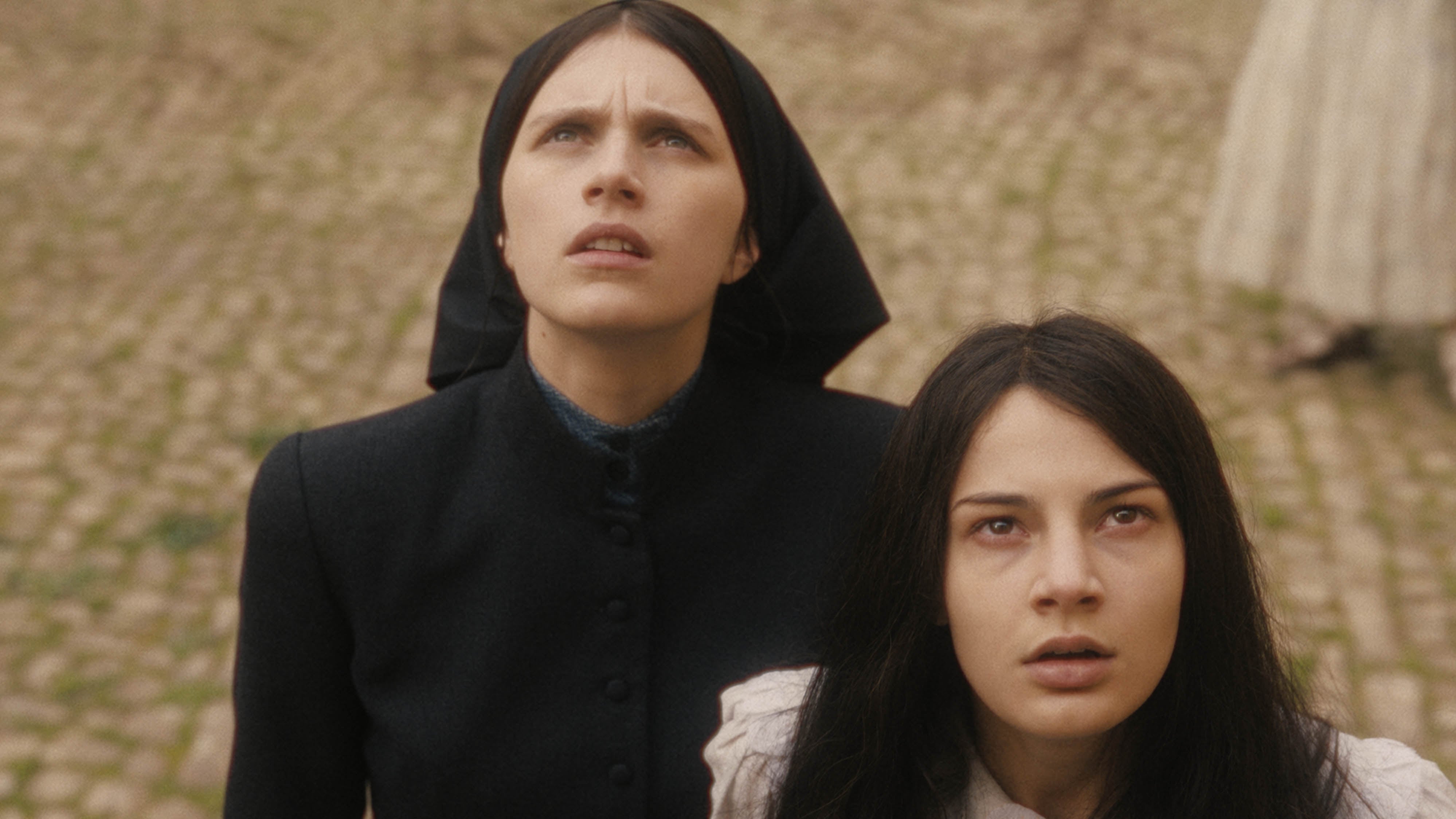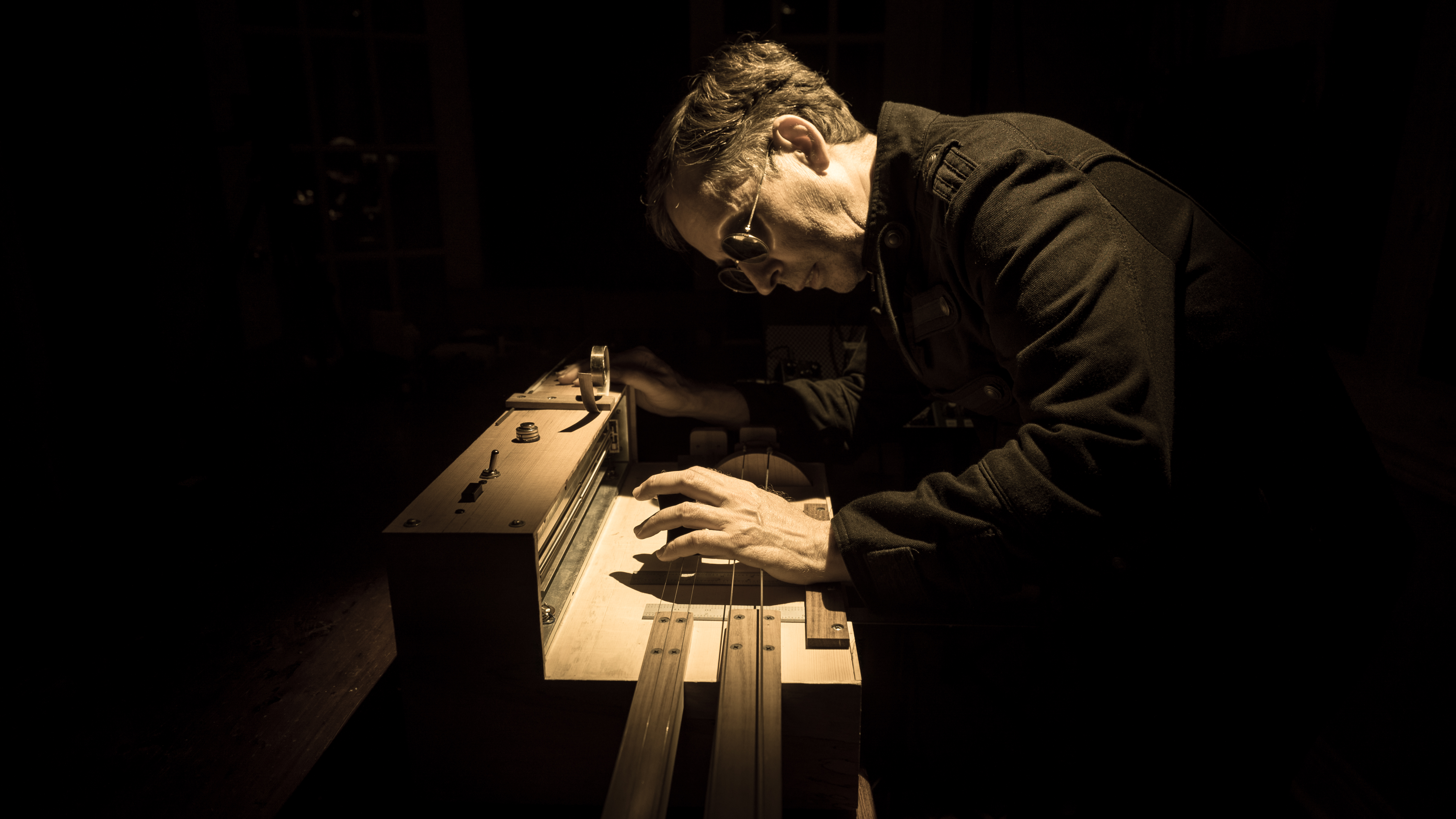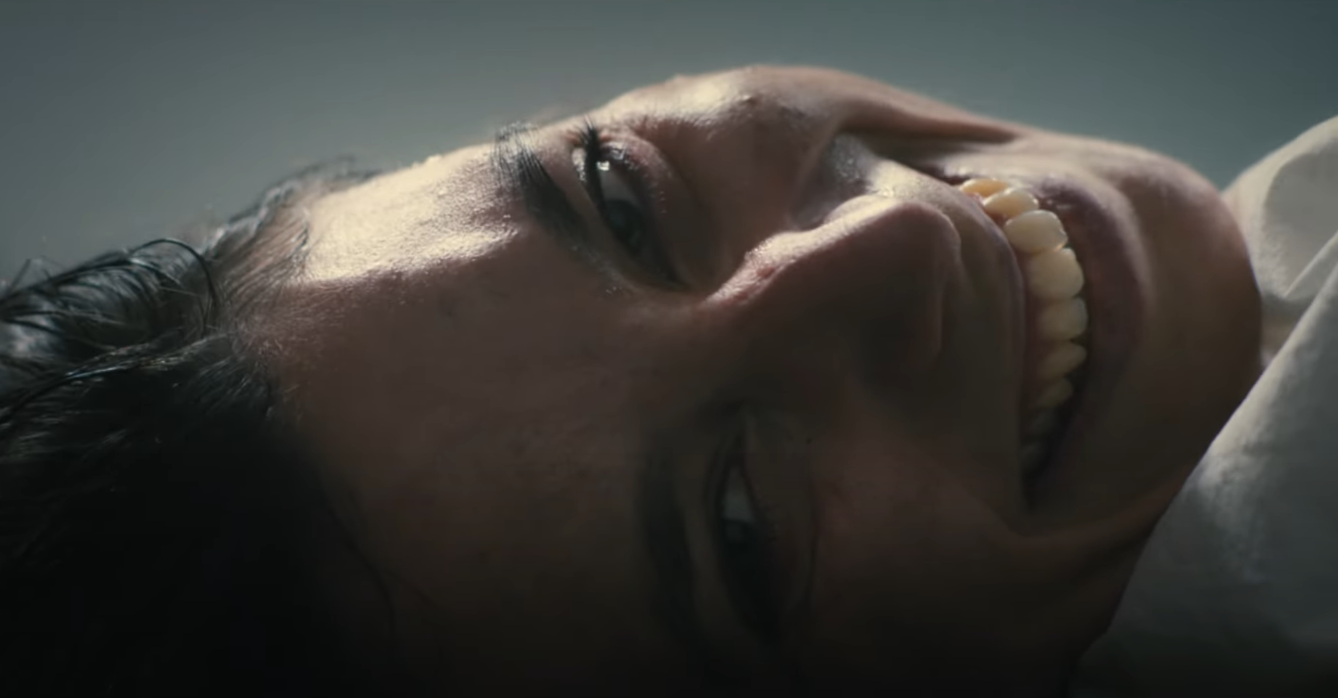‘The First Omen’ Composer Mark Korven on His Devilishly Good Score

It’s safe to say that when 20th Century Studios announced they were making a prequel to Richard Donner’s 1976 horror classic, The Omen, it raised more than a few eyebrows. With multiple sequels and an iffy remake already under its franchise belt, one could practically hear the internet screaming, “Leave it alone!” Little did we all realize that The First Omen director, Arkasha Stevenson, had more than a few surprising tricks up her sleeve.
One of the earliest clues that The First Omen was going in a new and unexpected direction was that composer Mark Korven was hired to handle the film’s score. Known for his innovative approach to film scoring and his custom-made invention called The Apprehension Engine, Korven’s previous genre work includes The Witch, The Black Phone, Resident Evil: Welcome to Raccoon City, Cube, and more. Truly blessed with the ability to craft haunting and dynamic soundscapes, Korven’s unique style stands in stark contrast to the franchise’s previously established musical legacy and, thus, expectations.
In The First Omen, Korven pays tremendous tribute to The Omen’s Oscar-winning work by composer Jerry Goldsmith while also paving a new path entirely. Working in perfect harmony with Stevenson’s bold new vision for what The Omen franchise can be, Korven unites stunning vocal work, viscerally unsettling percussion elements, and a full range of orchestral wonderfulness into a score that is as beautiful as it is terrifying.
We recently had the privilege of speaking with Korven to learn a bit more about his experience working on The First Omen. During our conversation, we also discussed walking in Goldsmith’s shoes for a moment, crafting the score’s unsettling vocal passages, his affinity for working with up-and-coming directors, and so much more.

Dread Central: The Omen franchise has such a rich musical history. What were the early conversations with Arkasha like regarding the musical direction for this new installation in the franchise?
Mark Korven: Sure. Well, it was a bit of a push-and-pull on that because Arkasha really loved The Witch score. So she wanted me to bring some of that to The First Omen, some of the real uncompromising, aleatoric sort of music to the score. 20th Century, the studio, wanted to pay a little bit of a homage to Jerry Goldsmith from the original Omen film. They wanted to lean more in that direction. However, Arkasha did not want that.
I kind of landed somewhere in the middle because I felt it was right to tie in a little bit more of a melodic, harmonic approach that would be more suitable to the franchise and still keep the real aleatoric dissonance stuff going on as well. So, in the end, the studio was really delighted with the score, and Arkasha was over the moon. I think it was a good choice.
DC: Was that Goldsmith legacy at all a concern for you when you considered signing on to this project? I only ask because, well, it’s Jerry Goldsmith.
MK: Not really. I was just delighted to get the gig. I think if I had a concern, it would be more about the fans who understandably value that tradition of the Goldsmith sound. And I totally get that. But I looked at it like, ‘Why do it again?’ You know, it’s already been done and done well. Also, I don’t really write in that style at all. That’s just not my thing, so I wouldn’t be the right composer for that anyway. There are composers of that style of music that could write circles around me and there’s plenty of them out there. I have my own sort of special sort of quirky thing that I do, so I just tend to stick to that.
DC: From what I understand, you got involved with this film pretty early on. However, it took a while to hit the screen. Did that delayed production schedule impact you at all— positively or negatively?
MK: Well, you know, I’m not a big fan of scores that take two years to come to fruition, but there were good reasons for that, with COVID being one and the SAG strike being a major second factor. I was juggling a few other films at the time, so it wasn’t that big a deal for me. We, as composers, have “The Second Day Listen.” You compose on Monday, then listen to it on a Tuesday, and you go, “Oh, no. I’ve got to change that.” But this was like the three months later listen and going, “Oh, okay. Yeah. Now I realize what I should do.” So having that amount of time to really tweak, get into details and rethink things was kind of nice, really. There was loads of time—a silver lining.
DC: It’s cool to hear that Arkasha was willing to go bold with the score from the very beginning, as the film certainly doesn’t hold back in other areas. With a scene that is visually very strong, how do you approach those moments as a composer to ensure they feel balanced rather than excessive?
MK: That’s a good way of putting it, and yes, there was definitely some navigation with that. For [the birthing] scene, I was writing more of my real crazy kind of stuff through that. In the end we decided the scene itself was disturbing enough. It doesn’t really need the music to tell the audience that it’s disturbing because it’s so disturbing visually. So we really pulled back on the music for that, like way back. It’s about 25 percent of what I actually wrote to that scene, but the scene works great. And [Nell Tiger Free] in that scene is just fantastic.

DC: You are perhaps best known for your unconventional approach to scoring and use of bespoke instruments. However, The First Omen really spotlights some wonderful vocal work. Tell us a little bit about your experience working with these particular vocalists and composing for them.
MK: Yeah, for this score we went a little bit more conventional in the orchestration. Strings and choir are the essential parts of the entire score. Some of the more quirky things that I do, I added those in, but the heart and soul are the strings and choir. And it was great.
We recorded the score at Air Studios in London, and we had, I believe, a 35-piece choir that was brought in for that. Wonderful singers. They were like two-take singers. So, on the second take, they had it nailed. To work with musicians like that was pretty amazing. London Voices is the name of the ensemble.
For “The Jackal,” I had written some really, really, almost impossible-to-sing low voices for the little Jackal motif going on. So Jim, the orchestrator, brought in four low-voice specialists. They’re choral singers, but they can sing just crazy low. So they did that, which is pretty cool.
Also, for some of the really weird stuff, we used a small ensemble called the Element Choir. That’s a Toronto improv choir. So basically, you can say, “Okay, give me 10 seconds of birds getting squashed under a truck. Give me 10 seconds of the wind blowing through the trees while it catches on fire and wrap it up with a big disaster at the potato factory,” or whatever. You can explain it in those terms and they come up with that. Then, you mold it, work with them, and come up with what you want. They’re really good at doing some of the really strange stuff; the real guttural and crazy stuff. And then the choir is much more melodic, of course. So there were actually three different sorts of vocal ensembles going on.
DC: You were brilliantly restrained in implementing elements of Goldsmith’s music, which makes the moment that your rendition of “Ave Satani” appears all the more goosebump-inducing. What was it like reworking that iconic piece and walking in Goldsmith’s shoes for a moment?
MK: Yeah, it really is iconic. As far as me and my experience with horror music, what I remember from my childhood would be the Bernard Herrmann strings in Psycho and “Ave Satani” from The Omen. So that was amazing to re-record that. Recording in that big church that is AIR Studios is pretty crazy. I was out there with my iPhone filming the choir while they were doing that because being in the room with all that [sings the “Ave Satani” melody] was an amazing moment.
DC: In each installation of The Omen, there is an element of ambiguity regarding Damien and the unfolding events, and the music plays a big part in keeping those cards held close to the chest. How did that element of the story influence what you created?
MK: Well, the score is very much a slow burn It really doesn’t kick in until we’re like a third of the way in, and then it starts to kick in. I tend to be, believe it or not, more of an understated composer. I like to not be ahead of the scene in order to not give anything away, not be ahead of the action, and downplay the emotional part as well.
So, yeah, I like to think I’m understated unless it’s really called for me to go full-on, like the Sister Anjelica scene in the courtyard. That required full-on for that.

DC: What were some of your favorite characters or elements to develop music and themes for?
MK: Sure, sure. The Jackal is definitely a very primitive beast. So we were looking for something very primeval and very savage. And the Element Choir is perfect for that. I mean, they can really do that kind of stuff. And let’s see. Well, I had motifs all over the place.
There was a motif I used, which was kind of a Gregorian chant with that single voice. I played a drone that was very much out of key with the chant so you have that mix of familiar but off-kilter because you’re always trying to have the audience be not on solid ground. Musically, they don’t know what’s happening. Or there might be a bit of familiar, but they go, “Oh, something’s not quite right.” So you’re really playing with that a lot.
A lot of it was sort of church-based. So we have Cardinal Lawrence’s theme, which is actually one of my favorite pieces. It was more what I guess you would call maybe a more traditional choral style. It’s quite a beautiful sort of choral piece, but it sort of drifts off and becomes, something else. For Sister Anjelica, because she’s kind of kooky, I had a woodblock thing, which is a sign that she is making an appearance.
DC: Over the years, you’ve worked with many new and up-and-coming directors, including Arkasha Stevenson. For example, you worked with Robert Eggers on The Witch, Bryce McGuire on Night Swim, and Santiago Menghini on No One Gets Out Alive.
What is it that you enjoy about working with young talent, and what are some of the aspects of working with them that require a bit more patience?
MK: Yeah, well, the good thing about working with first-timers is that they tend to really want to make their mark and be a little bit bold and uncompromising. I think Arkasha is a good example of that. And certainly Robert Eggers is a good example of that.
I think the downside is the lack of experience in making features. So there’s that. And there’s a certain amount of guidance that has to be done. Like, I’ll tell you a story with Arkasha—because [the production] was spread out over two years, I was giving them all kinds of rough score that they were cutting in.
So, it was over a year of cutting and them changing and moving things around, you know. It wound up being, frankly, a bit of a mess. It just wasn’t working because we never spotted the film, which is kind of unusual. The tradition that I have is you always spot the film before you begin working. And that never happened.
So, the head of the music department at 20th Century said, “No, you have to spot this thing.” So I went down to LA, and we did a 10-hour spotting session. We went through all the themes, and how everything was tying together. And, finally, it all made sense. I could go home and I could work with it and have it feel like a complete score. So that was a really good reminder for me to not abandon the traditions that are there for a very good reason because they make for a better score. And it was really good for Arkasha because I don’t know if she really spotted very much, but she certainly appreciates spotting now and the difference that it can make. So that was really great.
DC: You’ve also worked on some wonderful TV and streaming shows lately, like, Chapelwaite, Them, and The Terror. How does scoring for TV challenge you differently than film, and what do you enjoy about scoring for a television format?
MK: Locked picture is what I most enjoy. For example, I’m working on a series right now and every time they send me video, it’s complete. I can just go ahead and spot, work on it, and turn it in. I just love that because, in a lot of situations, especially with feature films, you’re working with rough cuts all the time.
In fact, when we recorded the score for The First Omen, the film was still not complete. So, I was working with basically a “fine” cut. Thankfully, we had a great editor on board and he made it all work in the end. But often it’s a case where I sometimes never see a locked picture, and sometimes I see it at the very end, which is an extremely unusual way of working these days.
But, you know, it happens. It tends not to be that way in television or streaming or whatever you want to call it, because they’re on a schedule. It’s like, “Wham, bam, boom!” You have to get it done. You have to get it out the door. And I actually really like the discipline of that. There’s no time to rethink it very much. You just follow your instincts. You know how many minutes per day you have to compose. It can be a little bit like a sausage factory in a way, but I do love that order and the discipline of scoring like that. And then, when you get tired of it, a feature comes in, and all that goes out the window. [Laughs]
DC: Before I let you go, there was one more thing I wanted to pick your brain about. When it comes to The Oscars, the original score for The Omen is one of the only genre scores ever to win Best Original Score.
MK: Yeah, you’re right. It’s very, very rare to see that.
DC: Those scores are crucial for the success of their films, so do you have any thoughts on why they consistently get overlooked? I get that they’re often unsettling, but there’s still an art to it and unsettling is kind of the point, right?
MK: Maybe it’s just a bit more of a niche thing with The Academy. It tends to be not very safe, I guess. I don’t know. Hard to say. But yeah, that’s the point. And it’s literally my job. [Laughs]
Korven’s score for The First Omen is now available to pre-order on vinyl from Mutant in partnership with Hollywood Records and 20th Century Films. The estimated release date is June 28, 2024. The score is also currently available to stream on all major streaming platforms.
Categorized:Interviews

